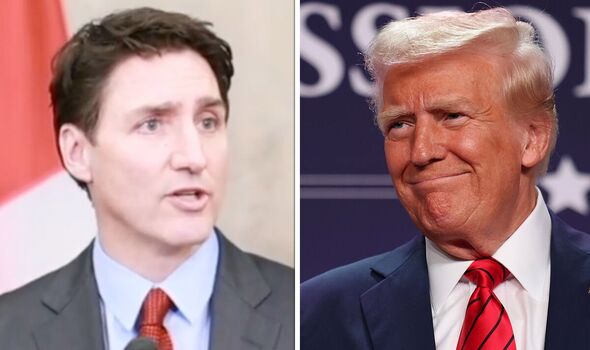Justin Trudeau responds to US imposing tariffs on Canada
Donald Trump has followed through with his threat to impose steep tariffs on imports from Mexico, Canada, and China, signing an order which triggered sparking swift retaliation from all three countries – and all-but-guaranteeing a bruising trade war.
The Republican president posted on social media that the tariffs were necessary “to protect Americans,” urging the three nations to do more to curb the production and export of illicit fentanyl, and for Canada and Mexico to reduce illegal immigration into the US.
Mr Trump has also signalled his intent to impose tariffs on imports from the European Union, further escalating tensions. However, there is no indication at this stage that the UK will be subjected to the new measures.
If sustained, the tariffs could significantly worsen inflation, threatening the trust many voters placed in Mr Trump to lower the costs of groceries, petrol, housing, cars, and other goods as he had promised.
They also risk plunging the global economy and Trump’s political mandate into turmoil just two weeks into his second term.

Justin Trudeau has lamented Donald Trump’s decision (Image: GETTY)
Mr Trump has declared an economic emergency to impose duties of 10% on all imports from China and 25% on imports from Mexico and Canada.
Energy imports from Canada, including oil, natural gas, and electricity, would be taxed at 10%. His order includes a mechanism to escalate the tariffs in response to retaliation, raising the prospect of an even more severe economic disruption.
Canadian Prime Minister Justin Trudeau announced that Canada would impose matching 25% tariffs on up to $155 billion in US imports, including alcohol and fruit.
He warned: “The actions taken today by the White House split us apart instead of bringing us together.”
Channelling the sense of betrayal felt by many Canadians, Mr Trudeau reminded Americans that Canadian troops had fought alongside them in Afghanistan and had helped respond to numerous crises, from wildfires in California to Hurricane Katrina.
He said: “We were always there standing with you, grieving with you, the American people.”
Mr Trudeau warned of economic hardship as the tariffs take effect but encouraged Canadians to “choose Canadian products and services rather than American ones.” However, he also expressed confidence in the enduring relationship between the two nations.

Claudia Sheinbaum, Mexico’s President (Image: Getty)
He said: “It is going to have real consequences for people, for workers on both sides of our border. We don’t want to be here. We didn’t ask for this, but we will not back down in standing up both for Canadians and for the incredibly successful relationship between Canada and the United States.”
Mexico’s president similarly ordered retaliatory tariffs.
Claudia Sheinbaum, writing on X, said: “We categorically reject the White House’s slander that the Mexican government has alliances with criminal organisations, as well as any intention of meddling in our territor.”
Ms Sheinbaum said her economy secretary had been instructed to implement countermeasures, including retaliatory tariffs.
She added: “If the United States government and its agencies wanted to address the serious fentanyl consumption in their country, they could fight the sale of drugs on the streets of their major cities, which they don’t do, and tackle the laundering of money that this illegal activity generates, which has caused so much harm to its population.”
The premier of British Columbia, David Eby, called on residents to stop buying liquor from US “red” states and said that American alcohol brands would be removed from government store shelves in response to the tariffs.
China’s Ministry of Foreign Affairs said the country “firmly deplores and opposes this move and will take necessary countermeasures to defend its legitimate rights and interests”.

Democratic Party Senate Leader Chuck Schumer (Image: Getty)
China began regulating fentanyl-related drugs as a controlled substance class in 2019 and had engaged in “counter-narcotics cooperation with the US,” the ministry said, urging Washington to correct what it described as wrongful actions.
The tariffs will take effect on Tuesday, setting the stage for a North American showdown that could potentially stifle economic growth.
A new analysis by the Budget Lab at Yale outlined the potential damage to the US economy, estimating that the average household would lose the equivalent of £940 ($1,170) in income as a result of the tariffs.
Economic growth would slow, inflation would worsen, and the situation could be even more severe if other nations retaliate.
Democrats rapidly blamed Mr Trump for any future inflationary pressures.
The United States has confirmed that it intends to impose 25% tariffs on most Canadian goods, with 10% tariffs on energy, starting February 4.
I’ve met with the Premiers and our Cabinet today, and I’ll be speaking with President Sheinbaum of Mexico shortly.
We did…
— Justin Trudeau (@JustinTrudeau) February 2, 2025
Senate Democratic leader Chuck Schumer of New York, also posting on X, said: “You’re worried about grocery prices. Don’s raising prices with his tariffs.”
Another post added: “You’re worried about tomato prices? Wait till Trump’s Mexico tariffs raise your tomato prices.
“You’re worried about car prices? Wait till Trump’s Canada tariffs raise your car prices.”
A senior US administration official, speaking on condition of anonymity, said the lower rate on energy imports was intended to minimise disruptions to petrol and utility prices.
The White House is acutely aware of the risks to inflation, with past price spikes under former President Joe Biden having contributed to voter frustration that helped return Mr Trump to office.
The order signed by Mr Trump contains no provision for exemptions, the official said, potentially affecting homebuilders reliant on Canadian timber, as well as farmers, car manufacturers, and other industries.
